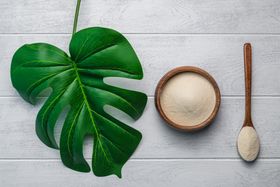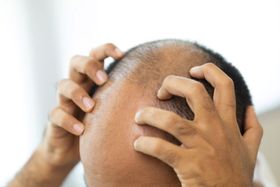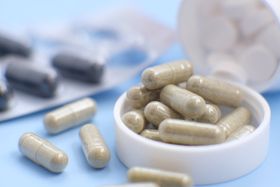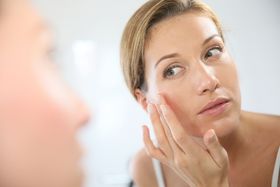Biotin vs. Collagen: Which Should You Use?
Published May 26, 2022.

Biotin and collagen are big names in the cosmetic industry. With time, it has grown in popularity for its effect on skin, hair, and nails. However, biotin and collagen are very different, and so are their functions. While collagen is a protein that your body produces, biotin is a vitamin that needs to be obtained from food.
What Is Collagen?
Collagen is a fibrous protein and the major component of almost all connective tissues. It is the most abundant protein in the human body.
Collagen originates from the Greek word "kolla," which means glue. It is indeed the glue that binds your body together. It provides structural support and strength to your body. Collagen is found in the muscles, bones, ligaments, cornea, blood vessels, tendons, skin, hair, nails, and teeth. Your hair, skin, and nails are 90 percent collagen (1).
Even though collagen is produced naturally, it starts to dwindle with age. You stop making collagen once you are 25, and by the time you are 30, the body starts to lose collagen. The drop is quite significant for women after menopause (2), (3
). Collagen loss shows in your skin, hair, or nails and may manifest as joint pain, gastrointestinal issues, etc.
Collagen supplements can help. Most of them are hydrolyzed peptides, which means collagen is broken down in a form that is easy to absorb. This is only available in supplements and not in food.
What Is Biotin?
Biotin is an essential B-vitamin and is also known as vitamin B7. It is often called vitamin H because of its effects on hair. Your body can’t naturally make biotin; therefore, you must get it through food and supplement for optimum function.
Biotin is a cofactor and is crucial in carbohydrate, protein, and fat metabolism. It plays a very important role in the body—producing energy from the food you eat. It helps maintain a steady blood sugar level and supports cell growth (4).
Biotin comes from the Greek word “biotos,” which means life or sustenance. It keeps your skin, hair, eyes, liver, and nervous system healthy. Similar to collagen supplements, biotin supplements have also gained popularity for their benefits.
Can I Take Biotin and Collagen Together?
Both biotin and collagen are big players when it comes to hair, nail, and skin health. While biotin is known to stimulate hair growth and strengthen nails, collagen helps slow down aging, reduces wrinkles and cellulite, and stimulates hair growth.
Whether you can take biotin and collagen together depends upon your needs. If you are looking for a supplement for joint health, bone health, and reducing bone loss, you can go for collagen supplements. If you're looking for something to help treat your dermatitis or alopecia, you can go for biotin.
However, if your concern is brittle nails, excess hair fall, and acne, biotin and collagen can be taken together. Both play vital roles in supporting hair, skin, and nail health. Both supplements are safe and complement each other well.
Foods High in Collagen and Biotin
For adolescents and adults, 30-100 mcg of biotin is recommended per day.
Foods that are high in collagen include:
- Bone broth
- Skin, bones, tendon, and ligaments of beef, pork, poultry, eggs, and fish
- Organ meat
Foods rich in protein, zinc, copper, and vitamin C can also help collagen production in the body. Foods that are high in Biotin include:
- Meat, including organ meat
- Egg yolk
- Milk and milk products
- Mushrooms
- Fish
- Nuts such as almonds and peanuts
- Whole grains
- Seeds
- Vegetables such as broccoli, cauliflower, spinach, and sweet potatoes
- Fruits such as avocado, apples, and bananas
- Nutritional yeast
What is the Difference Between Collagen and Biotin?
Collagen is a protein, and biotin is a vitamin. Your body produces collagen until the age of 25, while biotin is an essential nutrient that needs to be obtained from food and supplements. Collagen supplements can help improve skin elasticity and hydration. It can help relieve joint pain, prevent bone loss, boost muscle mass, and promote heart, gut, and brain health.
In addition, collagen supplements also help strengthen the hair follicles, promoting healthy hair. It can prevent hair follicle damage and reduce graying. Biotin supplements help stimulate keratin hair growth and increase the rate of follicle growth.
Collagen deficiency occurs with age. In addition, smoking, excessive exposure to the sun, and a high sugar diet can lower your collagen levels. Skin sag and wrinkles, joint pain, stiff tendons and ligaments, low muscle mass, thinner intestinal lining, etc., are some of the signs of collagen deficiency.
Biotin deficiency is rare but occurs due to genetic problems, long-term dieting, intestinal problems, chronic alcohol use, inflammatory bowel disease (IBD), certain medicines, and biotinidase deficiency. Scaly, red rashes near the eyes, nose, and mouth and thinning hair are some of the signs of biotin deficiency.
Collagen comes in many forms: powder, pills, gummies, and cream. Biotin only comes in pills. The benefits of collagen powder are numerous. While collagen supplements can make up for the decrease in collagen production that comes with age, biotin supplements work for people who are biotin deficient.
Look for a collagen supplement with vitamin C. Benefits offered by vitamin C not only include immunity-boosting and wound healing, but it is also vital for promoting collagen production.







